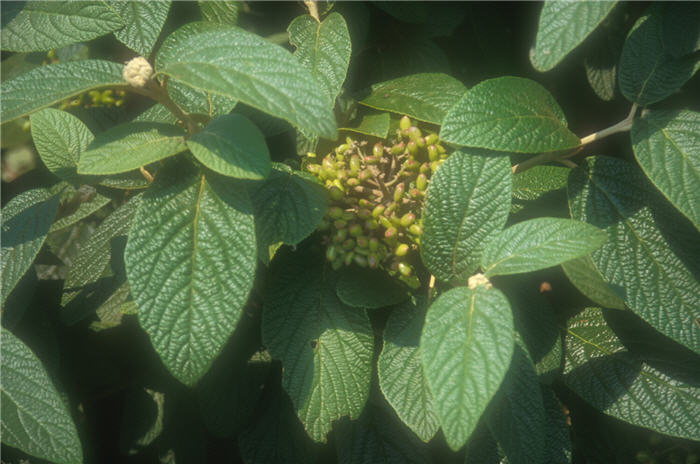| Botanical Name: Viburnum x rhytidophylloides 'Allegheny' | |
| Common Name: Alleghany Viburnum |

-
Anatomy
-
Culture
-
Design
Plant Type
Shrub
Height Range
6-12'
Flower Color
White
Flower Season
Spring
Leaf Color
Green
Bark Color
Grey
Fruit Color
Black, Red
Fruit Season
Fall, Persistent
Sun
Half, Shade
Water
Low, Medium, Extra in Summer
Growth Rate
Moderate
Soil Type
Sandy, Clay, Loam
Soil Condition
Average, Rich, Well-drained, Dry
Soil pH
Acid, Neutral
Adverse Factors
n/a
Design Styles
Formal, Japanese, Mediterranean, Ranch, Spanish, Woodland
Accenting Features
Fall Color, Showy Flowers, Unusual Foliage
Seasonal Interest
Winter, Spring, Summer, Fall
Location Uses
Background, Shrub Border, Foundation, Patio, Walls / Fences
Special Uses
Hedge, Screen, Mass Planting
Attracts Wildlife
Butterflies
Information by: Stephanie Duer
Photographer:
Photographer:
-
Description
-
Notes
This is a wonderful viburnum growing as an upright, densely rounded shrub, 10 to 12 feet tall and nearly as wide. It has large clusters of fragrant white mid-spring flowers that are followed by showy red fruit that ripens to black, greatly enjoyed by birds. Leaves are large, oval to elliptic, and of a soft, not-quite-glossy green. Fall color is tawny, but the leaves hang on well into the winter months, frequently not falling off until the new leaves begin to emerge in the spring. An excellent screen.
Grow in nearly any type of soil as long as it is well drained, though it grows best in sandy-loam to clay-loam soils. Moderately drought tolerant once established, especially when placed on the east or north sides of buildings or fences. Doesn't require pruning and resents shearing, so prune selectively to control size as needed (see Guides).